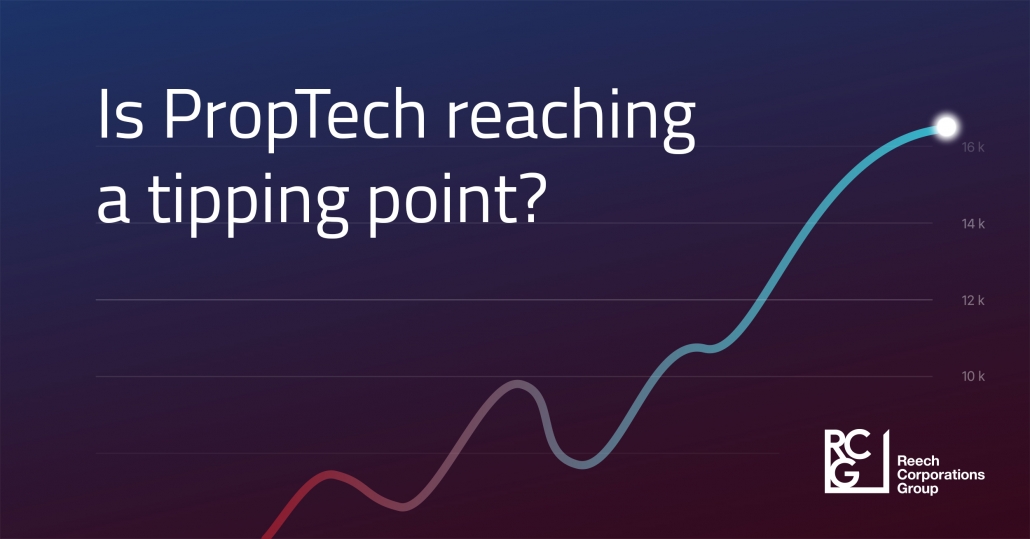“Learning and innovation go hand in hand. The arrogance of success is to think that what you did yesterday will be sufficient for tomorrow” – William Pollard
A new phase of innovation is starting to gather momentum and become entwined with both business models ripe for disruption, and the emerging technologies that precipitate that change.
The convergence provides solutions that disrupt, transform, and transcend industries that are ripe for change. One of these is the real estate sector, long stuck in the doldrums of change – and the innovative solutions that are emerging to do this – coined as PropTech – is now reaching a tipping point where it has moved from nascency to the norm.
Perhaps once a buzzword, PropTech has been used to describe the intersection between real estate markets and technology – challenging and changing every aspect of the built world. The PropTech space focuses on core trends of transparency, speed, and value for money, where digital solutions for the commercial and residential space have been ramping up equity financing in recent years.
Capital raising in the PropTech sector has been led by both newly created property technology funds (such as Fifth Wall and Pi Labs) and larger private equity incumbents wishing to gain greater exposure to the subsector. With approx. $10B deployed in real estate related technology companies in FY18, and $31.5B in FY19, 2020 is expected to be an even larger year as companies search for innovative solutions around 3 emerging themes; Internet of Things, Artificial Intelligence & Machine Learning, and Blockchain-based Smart Contracts.
In light of these emerging technologies, start-ups have largely fixated on improving all aspects of real estate, including; customer interactions & services, facility maintenance, task management automation, and advanced geospatial related analytics.
1. Internet of Things (IoT)
Encompassing anything and everything, increasingly IoT looks at devices that talk together and between each other, creating automated solutions that gather information, produce a comprehensive analysis, and then execute an-action upon it. IoT-enabled sensors and monitoring make it possible to create smarter and more efficient spaces in both commercial and residential sectors. In a recent IoT survey by Deloitte, 40% of respondents stated that they had already gathered IoT sensor data, where insights were predominantly being used for decision making behind space efficiency. Another statistic outlined that 64% of the executives surveyed by Deloitte said that they have increased their investments in IoT related technologies, and planned to at least hold or increase their commitments over the next 18 months.
Over 2020, we expect that IoT related products will continue to infiltrate the PropTech space, where this trend is expected to be further exacerbated as the rollout of 5G takes place, and our homes and working environments become smarter and evermore interconnected.
2. Artificial Intelligence/Machine Learning (AI & ML)
Despite its facade as an emerging technology, machine learning is really the amalgamation of 4 underlying pillars; statistics, linear algebra, calculus, and probability. The cross-pollination of these pillars enables artificial intelligence to produce non-linear products and results that were previously not possible, at a rate that was previously deemed unachievable. However, when scoping AI use cases, readers should note that the end solution is not to implement AI, but rather to use AI as a tool to help achieve a specific goal – an area that many businesses fail to achieve.
The PropTech sphere has seen AI applied to every aspect of real estate, optimising efficiency and user experience whilst minimising cost structures. Popular applications of AI/ML-based tools include chatbots on broker listing websites that interact with potential clients, coordinating and organising viewings whilst offering lifelike responses. Other examples focus on the use of geospatial data, completing trend analysis – scanning vast quantities of satellite imagery for pertinent features that can enhance and improve current analyst workflows.
3. Blockchain: Smart Contracts
In recent years the field of cryptography has gained attention as businesses have found innovative methods of applying techniques for secure communication in the presence of adversaries. However, similar to machine learning, cryptography is not a new field.
The recent attention towards distributed ledger technologies and/or blockchain has partially been driven by the recent hype surrounding cryptographic currencies such as Bitcoin and Ethereum. However, the central concepts have wide applications, whether that be in supply chain management, or enabling more secure financial transactions – this provides foundations for technologies and businesses that can be widely used every day. In the realm of PropTech, a popular use case is the process of tokenising commercial property investments, making property investments that have historically only been accessible to institutional investors, available to the wider public.
Through the digitisation of the real estate businesses and services, coupled with the utilisation of emerging technologies, organisations can further be empowered to make more precision-based decisions relating to; predicting property market values, market bubble forecasting, portfolio analytics, churn management, detection of spending anomalies, smart buildings/cities, tenancy management, asset digitisation, and smart logistical services.
As with many industries, the real estate sector is ripe for transformational change. Despite record-setting capital raises being closed in FY18 and FY19, an even more prosperous year is expected for PropTech, and with an expected IPO from Airbnb, there is plenty to come for 2020.
However, in order for PropTech companies to remain competitive in the start-up space, companies need to find methods of adding value to an industry that has historically been hesitant to technology adoption.
While “Location, location, location” will always have a role in real estate, perhaps the new mantra that Deloitte has termed ‘location, experience, analytics’ is more applicable for the PropTech arena.
